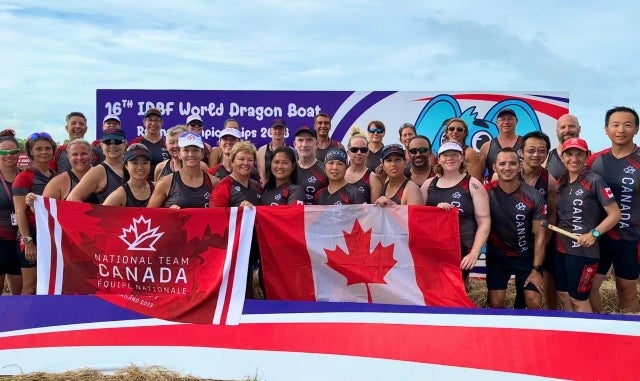Canada’s first national para dragon boat team brings home gold

By Randy Pinsky
This summer, Canada launched its very first national para dragon boat team to represent the country at the 16th World Dragon Boat Racing Championships in Pattaya, Thailand. Not only did they exceed expectations, but the team also represents critical progress in accessible sport.
From August 7 to 13, three Canadian crews battled the waters of Thailand in nine events, bringing home three gold, four silver and two bronze medals. The teams included a small PD1 boat (10 para paddlers), a small PD2 (10 paddlers, half being para) and a standard PD2 (20 paddlers, half being para).
In 2019, the International Dragon Boat Federation (IDBF) introduced a new division for world championships: Paradragons. “Dragon boating has al- ways been an inclusive sport, but the para division takes it to a whole new level,” said Canadian Para National coach Katy Milne.
The IDBF defines paradragons as “paddlers who have some form of physical, psychological, neurological, sensory developmental or intellectual impairment” – a broad classification which widens perceptions of disability.
Bronwyn Funiciello of Ottawa was one of three visually-impaired paddlers on the boat. “I have never been made to feel any different,” she said. “I am expected to paddle just as hard. No excuses or exceptions.”
Several of the other athletes have “invisible disabilities” or emotional or psychological challenges, such as anxiety, depression or post-trauma.
For instance, dragon boating helped Carmen Bevan from Kelowna, BC through the darkest moments of her life when she lost her daughter in a car accident in May 2021.
“I honestly know I would not have survived without the support of my paddle sisters and brothers,” reflected Bevan. “Paddling for the para team is about finding healthy ways to channel my grief.”
Today, she competes in honour of her daughter.
While Trois-Rivières paddler Simon Lamy is not a paradragon himself, he contributes insight and empathy due to having a sibling with cerebral palsy. “Being with my brother [has] made me a deeply different person for life,” he said.
In reflecting on their international debut, Milne said “I think we put Canada on the map with respect to para dragon boat[ing].
We surprised everyone - including ourselves!”
She hopes that the national para team’s performance on the world stage will challenge perceptions about athletes with disabilities. “It starts here,” she affirmed.









